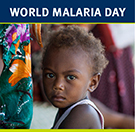This week at the Alfred Research Alliance, we look at sudden cardiac arrest and its cost to the community, focus on the fight against malaria in our region ahead of World Malaria Day, and launch two new initiatives – a website to support research into women’s health and the latest iteration of the ‘Sex, Drugs & Rock’n’Roll’ survey.
BAKER HEART AND DIABETES INSTITUTE
The cost of sudden cardiac arrests
 A study examining the economic impact of sudden cardiac arrest has found annual GDP losses in Australia run to nearly $2 billion, comparable to the productivity losses from all cancers combined. The study, led by Baker Heart and Diabetes Institute researchers and published today in the journal Resuscitation, emphasises the importance of reducing death from cardiac arrest at each point of the patient journey. Read more…
A study examining the economic impact of sudden cardiac arrest has found annual GDP losses in Australia run to nearly $2 billion, comparable to the productivity losses from all cancers combined. The study, led by Baker Heart and Diabetes Institute researchers and published today in the journal Resuscitation, emphasises the importance of reducing death from cardiac arrest at each point of the patient journey. Read more…
Cardiac arrests one of the biggest killers of Australians under 50
 ABC News this week reports that cardiac arrests are one of the biggest killers of Australians under 50, with doctors saying more research is needed. The story of 31 year old Brian Maris, who died in his sleep from unexplained sudden cardiac arrest, is a typical example of the condition which affects some 20,000 Australians a year. Less than 10% survive. Read more…
ABC News this week reports that cardiac arrests are one of the biggest killers of Australians under 50, with doctors saying more research is needed. The story of 31 year old Brian Maris, who died in his sleep from unexplained sudden cardiac arrest, is a typical example of the condition which affects some 20,000 Australians a year. Less than 10% survive. Read more…
MONASH SCHOOL OF PUBLIC HEALTH & PREVENTIVE MEDICINE
Website to support research on women’s lifestyle health during preconception and pregnancy

A new, NHMRC-funded Australian research centre is pioneering research to support healthy lifestyle with women before and during pregnancy. The Centre of Research Excellence in Health in Preconception and Pregnancy (CRE HiPP) today launched its website, which will become a hub for research news, knowledge transfer and collaboration in its specialised field.
BURNET INSTITUTE
Sex, Drugs and Rock’n’Roll survey goes live
 Examining changes in young Victorians’ behaviours and attitudes to health and wellbeing is the focus of Burnet Institute’s 17th annual Sex, Drugs and Rock ’n’ Roll (SDRR) survey. The online survey allows participants aged 15-29 years old to share, confidentially, their experiences so that researchers and decision makers can be better informed to develop policies affecting young people. Read more…
Examining changes in young Victorians’ behaviours and attitudes to health and wellbeing is the focus of Burnet Institute’s 17th annual Sex, Drugs and Rock ’n’ Roll (SDRR) survey. The online survey allows participants aged 15-29 years old to share, confidentially, their experiences so that researchers and decision makers can be better informed to develop policies affecting young people. Read more…
COVID-19 elicits concerns and hope on World Malaria Day
 On the eve of World Malaria Day 2021, there are concerns that years of progress towards the elimination of malaria could be lost because of the wider impacts of COVID-19 and global resources being devoted to it. However, this is tempered by optimism that malaria research and public health efforts stand to benefit in the longer term from lessons of the COVID-19 response. Read more…
On the eve of World Malaria Day 2021, there are concerns that years of progress towards the elimination of malaria could be lost because of the wider impacts of COVID-19 and global resources being devoted to it. However, this is tempered by optimism that malaria research and public health efforts stand to benefit in the longer term from lessons of the COVID-19 response. Read more…
Malaria in the Asia-Pacific: A complex but solvable problem
 In the face of the COVID-19 pandemic, it is easy to overlook the ongoing devastation caused by malaria, a parasitic disease that humankind has been battling for millennia and which continues to be a major public health threat in the Asia Pacific. In a recent article Burnet’s Dr Julia Cutts says eliminating the disease will depend on strong political leadership, renewed investment in R&D, and targeted approaches targeted to specific populations. Read more…
In the face of the COVID-19 pandemic, it is easy to overlook the ongoing devastation caused by malaria, a parasitic disease that humankind has been battling for millennia and which continues to be a major public health threat in the Asia Pacific. In a recent article Burnet’s Dr Julia Cutts says eliminating the disease will depend on strong political leadership, renewed investment in R&D, and targeted approaches targeted to specific populations. Read more…
